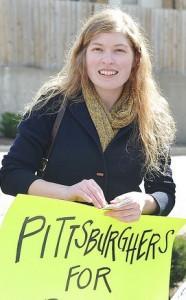by Alicia Williamson
 |
| photo by Dawn Jackman-Biery |
Pittsburgh is trying to establish itself as a “green city,” leading the way in innovative environmentally-friendly jobs, technologies, and policies. Cuts to public transit would be a major step in the wrong direction.
The Federal Transportation Administration and Environmental Protection Agency’s 2010 study of mass transit and climate change finds that public transit helps the environment by “providing a low emissions alternative to driving, facilitating compact land use, and minimizing the carbon footprint of transit operations and construction.” The city’s industrial past left Pittsburgh with one of the worst air qualities in the country. For each passenger-mile traveled, public transit produces 95 percent less carbon monoxide, 92 percent fewer volatile organic compounds, and about half as much carbon dioxide and nitrogen oxides as atypical car.
Other than riding a bicycle everywhere you go, switching to public transportation is the most effective way that you can reduce your carbon footprint. Riding transit instead of driving reduces your energy use much more than retrofitting your home, buying Energy Star appliances, or driving a hybrid car. Mass transit also minimizes our gas consumption and reliance upon foreign oil, saving 4.2 billion gallons of gasoline a year in the U.S. Buses that are full, according to PAT, are six times more fuel efficient than cars, and for every 10,000 commuters who switch from solo vehicles to public transit, 2.7 million gallons of fuel are saved.
Port Authority can lead the way in green initiatives that benefit our environment and community health by improving our air quality and reducing run-off pollution to our water supply. But it needs to be funded to do so. Increased investment in transit would allow Port Authority to expand its fleet of hybrid buses and experiment further with biodiesel. Public transportation infrastructure and innovation are keys to the sustainable development and general well-being of our region.
Alicia Williamson is a grad student at Pitt and a bus rider.
I agree with Ms. Williamson 100%. Public transportation is an essential component to both successful fiscal policy and environmental stewardship.